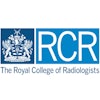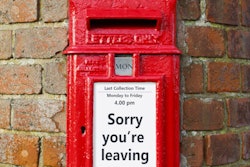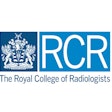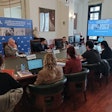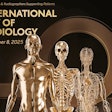
The Royal College of Radiologists (RCR) has published a series of reports highlighting significant national and regional staffing variations that persist across the U.K. Individual documents for England, Northern Ireland, Scotland, and Wales also show the scale of radiologist shortages in each country.
The four reports build on data from the annual U.K.-wide workforce report published in April, and they contain expert local opinions and solutions supplied by national standing committees and RCR representatives. They give details about the provision of radiology consultants, along with each country's current workforce shortfall.
"Workforce shortages are being felt again as services move to return to 'normal' rates of work, while facing a backlog of waiting patients and less capacity due to COVID-19 infection control measures, and with winter pressures looming," noted Prof. Mark Callaway, RCR's radiology workforce lead and medical director of professional practice for clinical radiology. "The new RCR reports detail particular local trends, however, they all reveal concerning gaps in interventional radiology provision and forecast meagre workforce expansion without concerted mitigation."
The key findings include the following:
- In England, the consultant radiologist workforce is 35% short-staffed and needs at least 1,698 full-time consultants to keep up with safe staffing quotas and the demand for scans -- without improvements, the workforce will only increase by 571 consultants over the next four years. Specialty trainees in England comprise 28% of the radiology workforce, and the trainee ratio is lowest in South East England (21%) and highest in North East England (37%).
- In Northern Ireland, the workforce is 27% short-staffed and needs at least 52 full-time consultants -- if nothing improves, it will grow by 12 consultants by 2024. Over the past five years, workforce growth has averaged 3% per year, compared with 4% seen across the U.K. as a whole. But over the past year, workforce growth in Northern Ireland has increased, with an additional 11 whole-time equivalent (WTE) consultant clinical radiologists joining the workforce, equivalent to 9% growth. Specialty trainees comprise 26% of the radiology workforce, compared with 29% of the U.K. workforce as a whole.
- In Scotland, the workforce is 31% short-staffed and needs another 141 full-time consultant radiologists -- without improvements, it will only grow by 34 by 2024. After five years of stagnation, Scotland saw an increase of 16 consultant clinical radiologists between 2018 and 2019, equivalent to 5% workforce growth. Specialty trainees comprise 31% of the radiology workforce in the country. The trainee ratio is lowest in the North East (24%) and highest in the South East (41%).
- In Wales, the workforce is 37% understaffed and needs another 93 full-time consultants -- without improvements, it is set to shrink, losing two consultants by 2024. The total of 171 consultant clinical radiologists in Wales equates to 156 WTEs. Workforce growth has averaged 2% per year over the past five years, or half of the 4% average growth seen across the U.K. as a whole. Workforce growth in Wales has slowed in the past year to less than 1%, and there was an increase of just one WTE consultant clinical radiologist in Wales between 2018 and 2019. Specialty trainees comprise 30% of the radiology workforce.
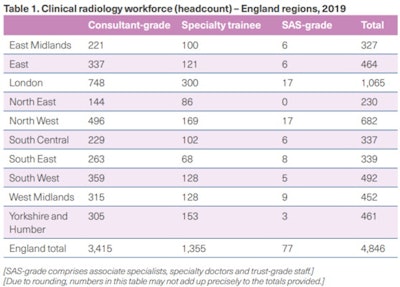
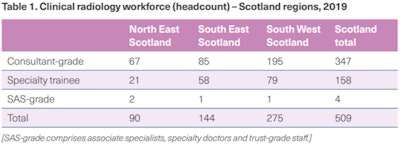
Overall, the RCR U.K. census data that underpins the four reports was returned in December 2019 and underlines the extent to which services were struggling before the advent of COVID-19, with most hospital imaging managers stating that radiologist shortages were threatening patient safety, according to Calloway.
"Our devolved nation reports show that going into the pandemic, the U.K. nations were struggling with radiologist shortages of between 27% and 37%," he said. "Regardless, imaging services stepped up and were active in diagnosing and treating coronavirus patients and ensuring those with cancer and emergency conditions could access scans and minimally invasive surgery during the peak of the pandemic."
He urged governments to fund improvements in National Health Service (NHS) imaging. "Without a properly resourced radiologist workforce, patients will suffer due to patchy access to life-saving interventional expertise and we will see a return to escalating imaging waits," he added.
You can download a copy of the four national reports free-of-charge from the RCR website.

